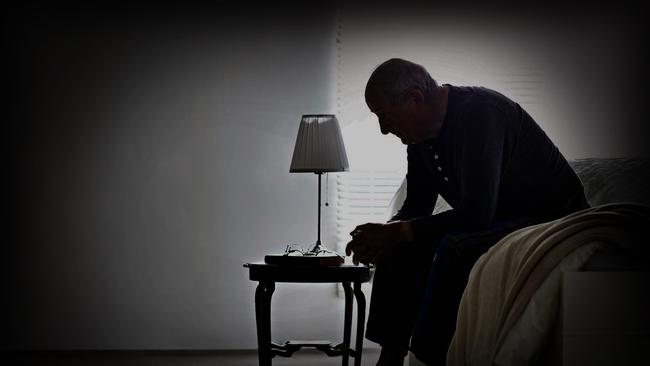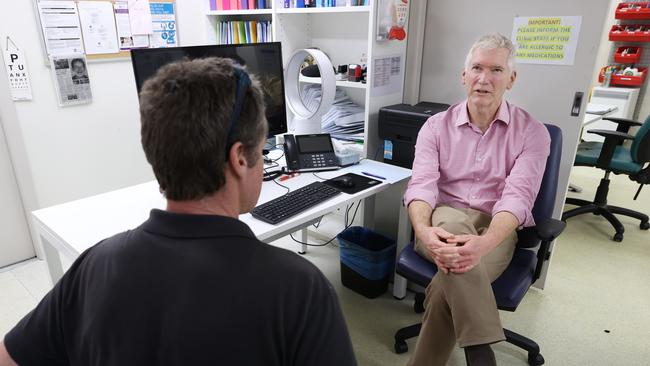Men, it’s time to talk about it
Despite public awareness campaigns and cultural shifts, men still struggle to talk about their mental health, meaning issues fester and can result in dire personal, social and relationships consequences.

Men generally find it more difficult to talk about how they are feeling thanks to generations of social behaviour and competitive norms that instil the belief that men crying, or even admitting to feeling sad, are signs of weakness. Having said this, one in four men will experience mental health issues, with depression and anxiety topping the list. A quarter of men declare they would not seek help for their mental health issue, even though up to 80 per cent of men affected will have seen a general practitioner in the past year for things such as a repeat script, back pain, musculoskeletal injuries or for an occupational health screen. A tragic consequence of this is that men often suicide without warning, making up more than three-quarters of suicidal deaths in Australia.
Triggers for mental health disorders that are common to all people include losing a job, experiencing bullying at work, a pregnancy (yes, men can have mixed emotions when this news is shared, and describe having concerns around affordability, responsibility and commitment), separation from a partner, and loss of a loved one. There can also be physical symptoms such as headaches, abdominal pain and digestive issues associated with mental health disorders, which might be the reason a person decides to see their GP but, as already mentioned, men will rarely disclose what’s going on in their personal life unless asked directly. They mostly end up presenting to the doctor because their spouse, friend, business partner, sister or mother has told them to go. It’s not uncommon to hear “the other half sent me, she thinks I’ve been a bit out of sorts” or, “my partner’s worried about me and says I should get a check-up”. In other words, non-specific reasons become a prompt for an experienced general practitioner.

Exploring this further in consultations often demonstrates that men generally don’t connect feeling sad, stressed or anxious, sleeping poorly, losing interest in things including sex, withdrawing socially and having frequent negative thoughts with their emotional state. They tend to downplay how bad they are feeling. Yet each of these can be precursors or symptoms of depression or anxiety; collectively, they point strongly to depression if persistent.
Some men describe that they are less tolerant, reacting angrily to small things, and admit to overusing alcohol to cope; younger men might behave and drive recklessly while using drugs as well as alcohol. Other behaviours suggestive of mental health disorder are working non-stop, or not showing up for regular activities, exercising constantly, negative self-talk, or trying to control everything. Having suicidal or violent thoughts are ominous signs and seeking help can prevent a tragedy from occurring.
Loneliness is a significant contributor to mental health disorders. In response to this, sports clubs, community movements such as Men’s Sheds (where men can connect and do “blokey things”), the global Movember movement (born of humble beginnings in Melbourne thanks to two men wanting to bring awareness to men’s health issues and suicide), and the R U OK day bring attention to this major public health concern.
Mental health disorders affect quality of life, work productivity and life expectancy. It’s everyone’s business to build kinder communities, so trust your gut if you think someone you work or live with just isn’t themselves, and reach out with something as simple as “you don’t seem yourself lately, I’m open for a chat”. Be open-ended and non-judgmental if the conversation starts flowing from there. Just listening helps. You don’t have to be an expert to make a difference.
Feeling sad, hopeless or angry can be normal unless these feelings don’t go away or are so pervading that they prevent you from doing what you normally do. Facing a life crisis, loss or disappointment without talking about how you feel exacerbates feelings of isolation and entrapment over time. This sets the scene for maladaptive coping mechanisms to develop – men who use alcohol or drugs will tend to use more if depressed and anxious; men who feel angry a lot of the time have a propensity to react with violence, and; those who gamble and take risks tend to play with higher stakes and lose more.

Having a male partner with an untreated mental health disorder is a known risk factor for intimate partner and family violence, affecting up to one in four women and exposing up to one in two children in Australia. Combine a mental health disorder with recent unemployment or alcohol and drug abuse and the risk of violence increases dramatically.
The heartening reality is that mental health conditions are treatable and even preventable in most people. Making the time to nurture intimate relationships, and seeking social connection through work and hobbies, helps reduce loneliness. Daily exercise triggers the release of endorphins, which promote happy feelings, whereas using alcohol to unwind generally makes things worse. It’s not uncommon to hear confessions of embarrassing or harmful behaviour occurring under its influence, so unwinding or defusing anger by taking a walk, deep breathing, calling a friend, or listening to music are better options. Learning to meditate and trying to achieve good sleep are also therapeutic.
Good advice to give someone going through this process is to delay making any new major decisions when depressed or anxious, until they have talked to someone about their mental health issues. Most workplaces provide access to free counselling sessions through an employee assistance program, which can be very helpful. Talking to a stranger about your feelings and seeking help is a big first step for the non-communicative type or those who feel there is stigma associated with having a mental health condition.
Although around 75 per cent of the mental health support for the community occurs in a GP’s rooms, there are online options for those not keen to talk to a person face to face. There are helplines such as Beyond Blue, Heads up Guys and the government Head to Health website. Speak with your GP, who can support you and provide you with a referral for counselling, or to confidential support services for alcohol abuse, addiction issues, problem gambling or anger management.
Being honest about what’s going on can be life-saving. Mental health problems are common, they are not a sign of weakness, and they can be managed with the help of your GP, a psychologist or psychiatrist. Sometimes just letting someone know can make a huge difference and help with recovery. Not everyone will require medication but, when needed, it can be very effective within a few weeks. As with most pharmacological treatments, some side-effects might be experienced; however, there are different classes of medication available and one that is suited to the individual can be selected.
Around 20 per cent of Australians will be prescribed antidepressant medication for a period over their lifetime, and although they are not addictive, cessation does require gradual weaning off. There’s been some negative commentary about this type of medication in the media of late; however, my experience is that it has helped many of my patients, and even been life-saving. Coupled with counselling, such medication can deliver terrific outcomes.
Mental health disorders are very common and can affect anyone, regardless of background or status. Ingrained masculine norms and the “stiff upper lip” mentality are detrimental to health. It’s okay to admit you’re not feeling good – connecting with others and just talking is a great place to start.
Associate Professor Magdalena Simonis AM is a senior honorary research fellow at the University of Melbourne department of general practice.
If this story has raised issues for you, contact Lifeline on 131 114.
* This column is published for information purposes only. It is not intended to be used as medical advice and should not be relied on as a substitute for independent professional advice about your personal health or a medical condition from your doctor or other qualified health professional.
References
https://mensshed.org
https://conversations.movember.com/en/resources/checking-in-with-a-friend/
https://www.ruok.org.au/what-were-about
https://www.aihw.gov.au/reports/children-youth/australias-children/contents/justice-safety/children-family-violence
https://www.headtohealth.gov.au
https://headsupguys.org/depression-in-men/
https://www.beyondblue.org.au/get-support/talk-to-a-counsellor
https://www.gamblinghelponline.org.au/support-yourself-or-others/taking-action/seeking-support?language_content_entity=en
https://mensline.org.au/how-to-deal-with-anger/managing-anger/
https://www.dss.gov.au/communities-and-vulnerable-people-programs-services-gambling/gambling-support




To join the conversation, please log in. Don't have an account? Register
Join the conversation, you are commenting as Logout